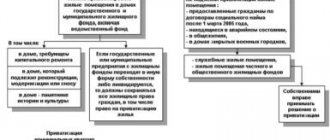Free and unlimited
The average cost of an apartment in large Russian cities has exceeded 3 million rubles. Not everyone for whom the housing issue is relevant can buy an apartment for cash or with a mortgage. But there is one way to get housing for free
– transfer municipal housing into private ownership.
In fact, of course, the family can already use their apartment without restrictions, but they cannot dispose of it (rent or sell it). In 2020, 22% of the total number of non-privatized apartments in Russia remained.
For the first time, Russians had the opportunity to privatize an apartment in 1991, when the corresponding Law of the Russian Federation of July 4, 1991 N 1541-1 “On the privatization of housing stock in the Russian Federation” was adopted.
You can download the text of the law here:
| “ Law of the Russian Federation “On the privatization of housing stock in the Russian Federation” » Downloading will begin immediately after clicking on the PDF icon |
| “ Law of the Russian Federation “On the privatization of housing stock in the Russian Federation” » Downloading will begin immediately after clicking on the Word icon |
In simple words, privatization is the free transfer of an apartment owned by the state (usually represented by a municipal entity) into the ownership of the residents of this apartment.
Housing can be privatized under several conditions
, and the main ones are:
- all owners who plan to obtain ownership of an apartment have not previously used this right;
- they are registered in an apartment that was transferred to them for use under a social tenancy agreement;
- housing does not belong to some categories (service, emergency, etc.).
The latest legislative changes in the privatization process date back to 2020, when it was made indefinite
. Before this, free privatization was supposed to be completed even earlier, but its cancellation was postponed 5 times. According to current legislation, privatization is free and unlimited for all citizens of the Russian Federation.
And although the privatization procedure is quite common (over 25 years more than 30 million apartments have been privatized
), it still has many nuances that you need to know about. Moreover, now you can do this at any time.
Lawyer services for apartment privatization
Lawyers and advocates for apartment privatization solve specific problems or provide package services. The latter means turnkey support of the case right up to the receipt of the title deed. Typically, apartment privatization lawyers work in the following areas:
- preparation of a package of privatization documents and submission to the Housing Policy Department;
- development of an action plan for the principal;
- interaction with officials on whom the process depends;
- negotiations with applicants for participation in privatization;
- pre-trial challenge of refusal to privatize;
- drawing up procedural papers - statements of claim, petitions, responses to the claim;
- legal settlement.
First, our apartment privatization lawyers inform the client about the nuances of the procedure, duration and possible risks. After this, a list of services is selected and a cooperation agreement is concluded.
What and to whom can be privatized
The basic rule of privatization is that the housing that the family receives under a social tenancy agreement is transferred into ownership. This is the housing that the state provides to different categories of people in need of improved housing conditions (the list is large, the main ones are the poor who are not able to buy their own apartment).
Get housing under a social rental agreement
as a low-income family it is now very difficult (even in Moscow apartments are given to those on the waiting list who were registered in the early 90s), in other cases it is still possible:
- eviction from other social housing, which is recognized as unsafe and has been resettled;
- various social programs at the local level (providing housing for doctors, teachers, etc.);
- providing housing for orphans, etc.
As soon as housing has been received under a social tenancy agreement, you can immediately ( except for orphans)
, they will be able to do this only after 5 years).
There are several requirements for employers
who can privatize an apartment:
- citizenship of the Russian Federation;
- registration in an apartment under a social tenancy agreement (actual residence is not necessary);
- Previously, the right to free privatization was not used (by any of those who will privatize housing);
- if one of the residents does not want to participate in privatization, his refusal is required.
Housing will be transferred to the ownership of all apartment residents who have not provided a waiver of privatization, including minor children.
The situation with minors is special - they also receive a share in privatization, and it is possible not to include a child in privatization only with the permission of the guardianship authorities
(which, traditionally, they almost never give).
Therefore, an exception has been made for minors - upon reaching the age of 18, they again receive the right to privatization.
There are also several requirements
:
- the apartment has not previously been privatized and is in municipal ownership;
- the house has not been assigned emergency status;
- is not in a hostel, in a closed military city, is not a service apartment;
- does not apply to a stationary social protection institution in rural areas (boarding house).
In addition, in some cases the authorities do not give consent to the privatization of apartments in buildings of cultural or historical value
. There is no direct ban on the privatization of such housing, but refusals do occur.
Cost of housing privatization
In order to privatize your apartment, you need to prepare documents for submission to the BTI at the first stage of privatization.
Prepare for the fact that you will have to spend a lot of time and effort collecting a package of documents. In addition, for the preparation of most certificates and extracts, you must pay a state fee and other fees. Additional documents may also be required. And the shelf life of certificates is on average two weeks, so future owners who decide to deal with the procedure themselves will have to do everything in a short time. Read full information about free privatization here.
Many citizens are concerned about the question: how much does paid privatization cost? Until March 1, 2020, this procedure remains free; no one can say for sure how the cost of privatization will be calculated in the future. There is an assumption that the apartment will have to be purchased from the state at the cadastral value.
An equally popular question: is it possible to privatize an apartment with rent arrears? Read about it in our article.
Having a problem? Call a lawyer:
Moscow and Moscow region (toll-free call) St. Petersburg and Leningrad region
Necessary documents and privatization procedure
The procedure for privatizing apartments in itself is not particularly complicated - you need to collect a package of documents and submit them along with an application to the relevant government agency.
It's all about the package of documents, it is very extensive. In addition to the application (it is drawn up on the spot upon submission), you need to collect the following papers
:
- passports or other identification documents - for the applicant and all family members who are registered in the apartment;
- if a representative submits documents for someone, a notarized power of attorney for such actions;
- social tenancy agreement for a privatized apartment;
- if the apartment was received before 2005 - a warrant for its receipt. If it is not there, an extract or copy of the order of the executive authority issued by the archive;
- an extract from the house register for the period from July 21, 1991 to the date of registration of the applicant;
- certificate of non-use of the right to privatize housing at previous residence addresses;
- written consent (or refusal) of everyone registered in the privatized premises;
- technical passport for the apartment;
- floor plan;
- extract from the Unified State Register of Real Estate (not always needed);
- copy of personal account (certificate of absence of debts).
If in the case of passports and birth certificates there are usually no problems, then with other documents there may be difficulties.
So, a warrant to move into the apartment
Not everyone has preserved it, and if housing was received before 2005, it will be demanded. You'll have to go to the archives, but the warrant may not be there either. True, in some cities the administration itself requests this document (it is enough to mark the application that there is no warrant).
Lost social tenancy agreement
It’s easier to restore - all the data is in the registers, just contact the local administration. But there is one peculiarity here too. In the contract, one of the residents is indicated as the main tenant, and if he refuses the right to privatization, the social tenancy contract will have to be reissued. Usually it is enough to draw up an additional agreement to the main contract and have it approved by the administration.
Extract from the house register
and a certificate of non-use of the right to privatization is needed only if the extract from the personal file indicates that the applicant lived in another housing, which in theory could be privatized.
Regarding written refusals of privatization
, then a strange situation has developed in the regions: in some places such a refusal must be notarized, in others a simple written form is sufficient.
Certificate of absence of debts
may concern not only the usual utilities. Some municipalities have introduced a fee for social hiring on their territory - it comes out to about 10-15 thousand rubles per year. If they are not paid on time, privatization will be refused.
Problems with the cadastral passport
and an extract from the Unified State Register of Real Estate usually does not happen, but in rare cases there are errors in the cadastre. Then you first need to correct errors, and then collect these documents.
It often happens that some things can only be proven in court. For example, if it is not possible to take an extract from the house register since 1991, the archives may simply not have been preserved.
If the documents are collected, there will be no further problems, and the actions will be as follows:
- submit a package of documents (including an application that will be drawn up on the spot) to the privatization department of the local administration or MFC;
- you will need to choose what form of ownership
the apartment is transferred to - joint or shared, and if shared - then in what shares; - within 46 days, officials will prepare
documents for the transfer of the apartment; - then transfer agreement
- it means that the state agrees to transfer the apartment into the ownership of the applicants; - with the transfer agreement, you can go to Rosreestr
, MFC or the State Services website and register ownership.
Within 10 days, Rosreestr will register ownership, and the owners will now be able to fully manage their apartment.
Additional expenses
What may be included in additional costs? This may depend on the specifics of a particular situation, so we will indicate all possible cases when citizens will have to pay various fees and charges:
- payments for the issuance of certificates that will be required to confirm non-participation in privatization - these certificates are issued by BTI institutions, and the cost of the document is determined by the internal prices of these organizations (it must be taken into account that when changing several places of residence, a certificate will be required from each local BTI authority);
- payment of the state fee for issuing an extract from the Unified State Register of Real Estate about the absence of ownership of a real estate object - the cost of the extract for citizens starts from 200 rubles and depends on the method of submitting the request (through the Rosreestr department, through the Multifunctional Center or through the government services portal);
- preparation of a technical plan for a residential premises - this document will be required to register a property with the cadastral authorities, and its preparation is the responsibility of a cadastral engineer;
- payment for a notarized power of attorney if the employers decided to conduct business through a representative;
- payment of the notary fee for certifying the refusal of privatization in favor of other persons;
- payment of the state duty for carrying out registration actions at the Rosreestr institution - the amount of the duty is determined by the Tax Code of the Russian Federation and is 2,000 rubles for one piece of real estate (if several citizens are involved in the privatization transaction, the single amount of the duty will be divided between them on a proportional basis).
Also on the topic: Eviction after a court decision by bailiffs
The legislation does not provide for other types of payments and fees. Most certificates from a management company or housing and communal services company are issued free of charge (for example, a certificate of family composition or an extract from a personal account). Any requirement to charge a fee for these forms is unlawful, since the cost of issuing them is included in utility tariffs.
Do municipal authorities have the right to set fees for the preparation and execution of a privatization agreement? The requirement to make any payments when preparing a privatization agreement in municipal institutions will be illegal. If such an unlawful demand is made when submitting documents for privatization, citizens have the right to file a complaint with the prosecutor's office.
Price issue
Although privatization is formally declared to be free, in reality you need to spend money. The total cost depends on what stage the paperwork is at before the start of the process.
You will have to spend money on preparing the following documents:
- technical passport – minimum 1,200 rubles;
- extract from the Unified State Register of Real Estate – 350 rubles;
- power of attorney (if someone cannot submit documents in person) – 1,500 rubles;
- notarized refusal of privatization – from 3,000 to 4,000 rubles, depending on the number of those who refuse;
- The state fee for registering property rights is 2,000 rubles, when submitting an application through State Services - 1,400 rubles.
In total, in the most economical option you will have to spend 1,400 rubles
– this is if all the documents are available, and the application for registration is submitted through “Government Services”.
The principle of gratuitousness
The basis for the participation of citizens in privatization transactions is the Law of the Russian Federation No. 1541-1. The key principles of privatization, in addition to accessibility and one-time use, also include the right to make such transactions free of charge. What does this mean in practice? The legislator provides for the following nuances of re-registration of real estate rights for tenants of municipal apartments:
- transfer of housing into the ownership of citizens completely eliminates the obligation to pay the price of the property;
- the principle of gratuitousness applies to each participant in the privatization transaction, regardless of the number of tenants or the length of their stay in the municipal apartment;
- for the transfer of expensive real estate into the ownership of tenants, the state does not levy income tax (from the moment of registration of rights, only the obligation to pay property tax annually arises).
Also on topic: Termination of the right to use residential premises
Since the issue of completing the privatization program has been repeatedly raised in recent years, there has been talk of preserving the right to re-register housing on a paid basis. This implied the obligation to pay the cost of the transferred municipal property based on its inventory or cadastral value.
Since such a rule would significantly violate the rights of citizens who did not have time to take part in the privatization program before March 2017, it was decided to remove any restrictions on the deadlines for submitting documents. At the same time, the principle of free re-registration of rights to living space was confirmed.
Does this mean that employers will not have to incur any expenses at all during the privatization transaction? Law No. 1541-1 exempts citizens from having to pay the cost of housing to the municipality, but does not eliminate the obligation to pay additional costs, including fees and charges.
Is it profitable to privatize an apartment through real estate agencies?
Of course, it is cheaper to independently request and collect all certificates, resolutions, notifications, etc. from various departments than when a real estate agency does this for a citizen.
However, the involvement of specialists allows:
- Do not overlook any certificate or other form, without which your privatization application will be refused.
- Have all documentation on hand in a timely manner.
- Avoid hassle, standing in line and visiting a number of government agencies.
- See in a timely manner any errors or inaccuracies in the received certificates, inventories, notifications, etc.
- Prepare your application correctly.
An important point: in some cases, for example, poor legal skills in preparing documents or lack of time, you should not hesitate to contact an agency.
Where to go to privatize an apartment? Where do they make it? Where to begin?
The main difficulty in re-registration of real estate is the collection of documents. How to privatize an apartment yourself? If you do this yourself, it is better to contact the MFC.
This unit serves as an intermediary between citizens and organizations. MFC sends requests for information. Then informs citizens about this.
Before privatization, you need to establish who owns the housing. For apartments that became property before 1998, you need to apply for a request to the BTI. It was this organization that formalized the privatization until this year.
If housing was privatized after 1998, data about this is stored in the Unified State Register of Real Estate. The request can be submitted online on the Rosreestr website or directly come to the organization’s office. The service is paid (200 rubles).
Another way to find out about the status of an apartment is the information found on one of the most recent utility receipts. In municipal housing, the receipt will contain the line “housing rental”.
If the apartment is not privatized, you can take care of this issue yourself. All residents living in the area must participate in the process of housing transfer.
Only with the consent of all family members can registration begin. If at least one of the apartment residents expresses his disagreement, privatization will be impossible.
How is the privatization of an apartment carried out in stages? Who is dealing with this issue? Where to submit documents? How to do everything right? Check out our step-by-step guide and rules.
What do you get as a result?
Hundreds of privatization cases have passed through my hands; I can provide guarantees that every stage of our cooperation will be a significant step towards obtaining your own housing. My clients have already been convinced of these words and note that when they contact me, they experience the following advantages:
- Professional approach and efficiency in solving unforeseen situations.
- Strict compliance with client requirements without breaking the law.
- Providing real information.
- Providing practical recommendations.
- Reliability and feeling of security.
- An economical solution to many financial issues.
- Confidentiality.
- Oral and written consultations on all legal issues related to privatization.









